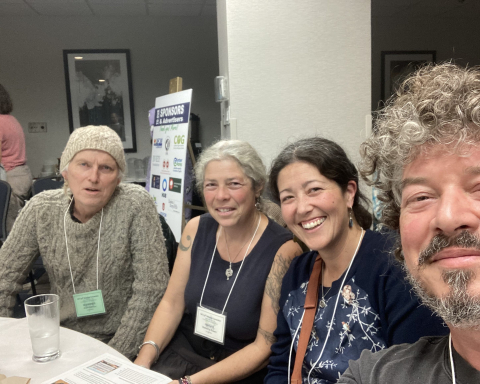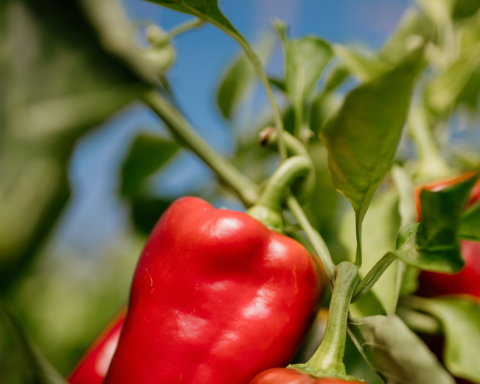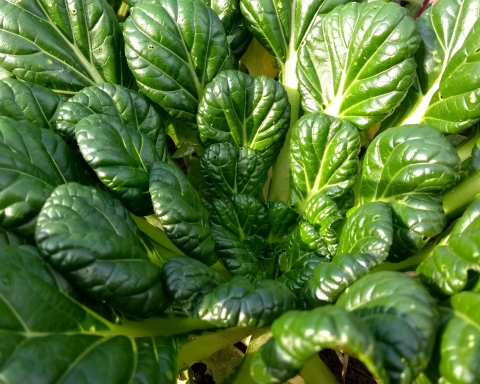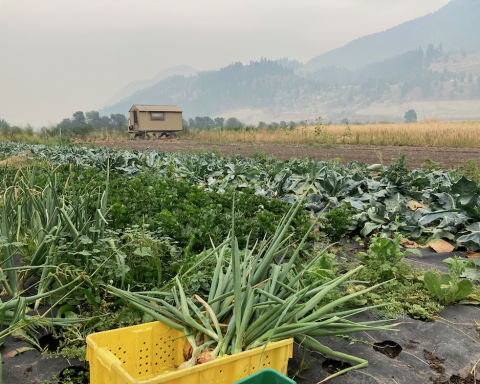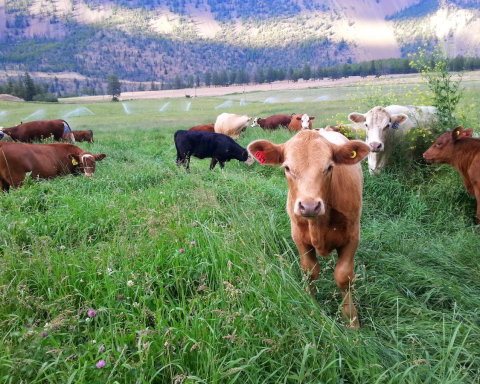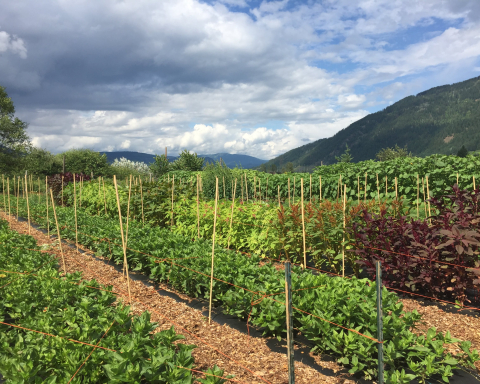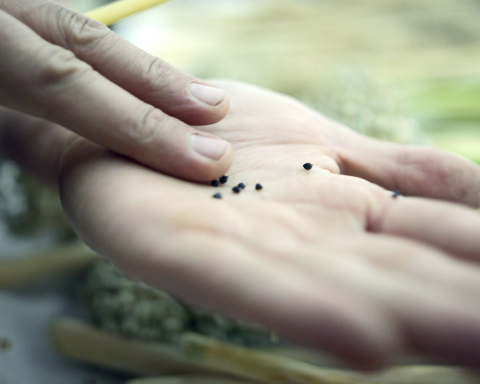By Susanna Klassen
The organic sector has many roots, and has been strengthened by a diversity of movements and ideas. Though rarely acknowledged, the sector was given a significant boost in the late 1960’s when hundreds of thousands of Mexican farm workers mobilized millions of consumers in the United States to boycott the conventional grapes and lettuce they were working to produce.(1) The boycotts were organized by the United Farm Workers under the leadership of Dolores Huerta, Cesar Chavez, and others, in collaboration with allies like the Black Panther Party. The protest was a response to the hazardous working conditions caused by unsafe applications of toxic pesticides. This was around the same time that the organic food movement was starting to gain traction among both farmers and consumers, and the boycotts bridged struggles for farm worker justice with the interests of health and social justice-minded consumers—a boon for the organic market in North America.(2)
We often hear about the influence of organic pioneers, such as Sir Albert Howard, and how their commitment to soil health helped shaped the organic sector. However, there are other movements, including the struggles for justice and labour by agricultural workers, without which organic agriculture would not be what it is today. The Canadian organic sector is anchored to some of these social justice roots through the organic principle of “Fairness,” which includes explicit reference to farm workers, and is “characterized by equity, respect, justice, and stewardship of the shared world, both among people and in their relations to other living beings.”(3) But, despite the inclusion of the Fairness principle in the introduction to the Canadian Organic Standards, the standards themselves do not contain a single requirement relating to social fairness, including for workers.
Today, the wellbeing of farm workers has once again been elevated in the public consciousness. The devastating impacts of COVID-19 shone a light on many of the ugliest parts of our food system, including insufficient access to protective equipment, deadly incidence of disease, and xenophobia experienced by essential farm workers, many of whom are racialized migrants.(4) The climate crisis also continues to threaten the health and safety of farm workers—look at the recent heat wave in the Pacific Northwest—and has already been deadly.(5)
Migrant workers are uniquely vulnerable due to their precarious and temporary status in Canada. Since migrant workers’ ability to work and remain in the country is tied to a single employer, they cannot easily leave unjust, abusive, or dangerous working conditions the way that workers with residency or citizenship status can. Despite regulations that are meant to guarantee minimum standards and conditions of employment, migrant workers’ access to these limited rights and benefits is effectively curbed by the risks associated with exerting them. Meanwhile, poor enforcement and follow up by regulatory bodies means that employers often break rules and cut corners at the expense of workers.
While not all organic farms hire paid workers, increasingly, more labour-intensive organic farms do hire temporary foreign workers through either the Seasonal Agricultural Worker Program (SAWP), or the Primary Agriculture stream of the Temporary Foreign Worker Program (TFWP). While we don’t know how many migrant workers are employed on organic farms, we know that organic farms in Canada use more labour than conventional farms in general. There is not good data specific to migrant labour on organic farms, but preliminary analyses of a survey I conducted of BC vegetable growers and publicly available data suggest that organic farms utilize migrant farm workers at a rate that is similar to conventional farms.
Numbers aside, it is clear that organic farms are not exempt from the structural inequities faced by migrant farm workers. Instances of abuse, neglect and unfair treatment of migrant workers have been documented on organic farms in Canada. These include several complaints of underpaid wages and poor conditions at Golden Eagle Blueberry Farm in BC, or the tragic death of two migrant workers at Filsinger’s Organic Foods & Orchards in Ontario. While these examples may seem extreme, many experts have pointed out that unfair conditions for migrant workers are not the result of a few “bad apples,”(6) but rather a system that disempowers and devalues migrant workers in favour of a flexible and dependable labour force.(7)
In recognition of these realities, and the lack of any requirements in the Canadian organic standards to enact the organic principle of “Fairness,” several organic community members have been asking what can be done to improve fairness in organics as it relates to labour. These efforts have included a petition to the organic standards review process for social fairness standards put forward by Organic BC’s own Anne Macey, in collaboration with Janine Gibson and Marion McBride.(8) While these proposed standards were not voted on by the Technical Committee (which governs the standards revision process) in the 2020 revision process, the committee has committed to discussing it again in 2025.(9) Additionally, several directors of the Organic Federation of Canada are already working on revising the proposed social fairness standards, which include but are not limited to standards relating to farm workers.
Another approach to embodying the principle of fairness, however, is to look to migrant workers and migrant advocacy organizations themselves and ask how the organic community could contribute to migrant justice demands in Canada. Together with other experts and advocates, and in light of exacerbated inequities caused by COVID-19, these groups have called on the federal and provincial governments for structural changes to the TFWP, including:
- Regularized/resident status for all migrants upon arrival and an end to repatriations;
- Granting of open work permits to migrants;
- Improved protections and benefits;
- Improved procedures to follow-up on complaints from workers;
- Stronger mandates and supports for employers;
- Improved inspection regimes;
- Improved access to information for workers; and,
- Improved representation of migrant organizations in planning and implementation of supports.(10), (11)
Another important issue that has been raised by groups like Fuerza Migrante (including during a session about Fairness and Solidarity with Migrants at the 2020 COABC conference) is the lack of worker voices in, and knowledge about, their own employment contracts. It is important to note that the changes that migrants and migrant advocacy organizations are seeking are much broader than the organic sector, and most are focused on structural and systemic changes to the temporary foreign worker programs, including how they are regulated and governed.
The theme and purpose of this fall issue to “harvest wisdom” from beyond the BC organic sector presents a valuable opportunity to contemplate how the organic community fits into a larger landscape of demands for change within and adjacent to the food system. Aided in part by the values-based grounding to the principle of Fairness, it seems that the organic community has made progress towards viewing labour generally, and migrant workers specifically, as inherently part of organic agriculture. But as of yet, migrant justice demands (including improved representation of migrant justice organizations in planning and decision-making) are not yet centred in the sector’s approach to Fairness.
Perhaps the sector can continue to explore what can be done to achieve Fairness through organic standards in addition to considering how they might advance migrant justice priorities. Treating migrant justice as the core of the Fairness principle seems like a good place to start.
Susanna is a PhD Candidate at the University of British Columbia. Her PhD research is about the contributions of organic agriculture to food system sustainability with a focus on labour and agroecological diversification. This article draws from a collaboration with Fuerza Migrante, a migrant worker collective, and a forthcoming publication by Susanna, Fuerza Migrante, and Hannah Wittman called “Sharing the Struggle for Fairness: Exploring the Possibilities for Solidarity & Just Labour in Organic Agriculture.”
Feature image: Credit: Fuerza Migrante
References:
- Araiza, L. (2009). “In Common Struggle against a Common Oppression”: The United Farm Workers and the Black Panther Party, 1968-1973. The Journal of African American History, 94(2), 200–223. doi.org/10.1086/JAAHv94n2p200
- Obach, B. K. (2015). Organic Struggle: The Movement for Sustainable Agriculture in the United States. The MIT Press.
- ifoam.bio/why-organic/principles-organ ic-agriculture/principle-fairness
- Migrant Workers Alliance for Change. (2020). Unheeded Warnings: COVID-19 & Migrant Workers in Canada.
- aljazeera.com/economy/2021/7/15/what-choice-do-we-have-us-farm-workers-battle-deadly-heat-wave
- Hennebry, J. (2010). Not just a few Bad Apples: Vulnerability, Health and Temporary Migration in Canada. Canadian Issues / Thèmes Canadiens, Spring, 73–77.
- For a more in-depth article about temporary foreign worker programs and the organic sector, see the following piece from the BC Organic Grower by Robyn Bunn, Elise Hjalmarson, and Christine Mettler, collective members of Radical Action with Migrants in Agriculture (RAMA) Okanagan: bcorganicgrower.ca/2017/04/tem porary-migrant-farm-workers-in-bc
- Anne Macey wrote an article for the Canadian Organic Grower about Fairness in Organics, which you can find here: cog.ca/article/opin ion-fairness-organic-agriculture
- CGSB. (2020). Organic production systems: General principles and management standards (National Standard of Canada CAN/CGSB-32.310-2020). Canadian General Standards Board. publications.gc.ca/site/eng/9.854643/publication.html
- Migrant Rights Network. (2020, May 7). Status for All – for a Just Recovery from COVID-19. migrantrights.ca/statusforall
- Haley, E., Caxaj, S., George, G., Hennebry, J., Martell, E., & McLaughlin, J. (2020). Migrant Farmworkers Face Heightened Vulnerabilities During COVID-19. Journal of Agriculture, Food Systems, and Community Development, 1–5. doi.org/10.5304/jafscd.2020.093.016



